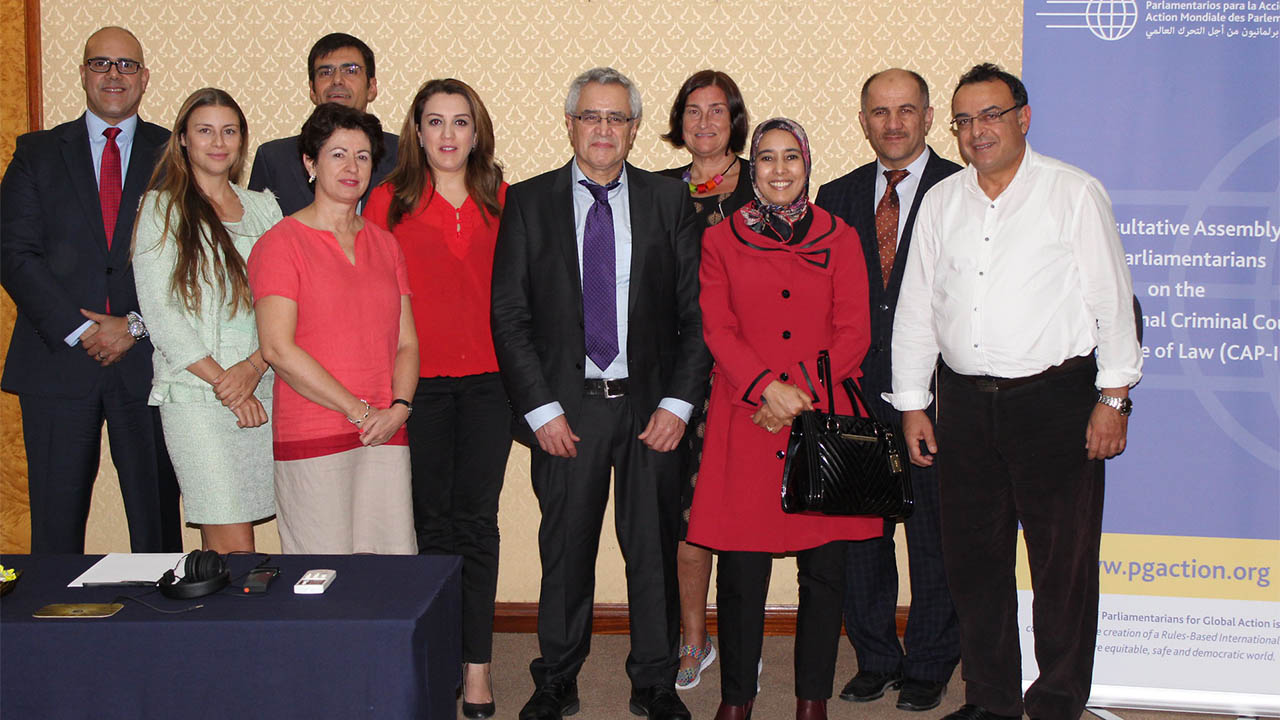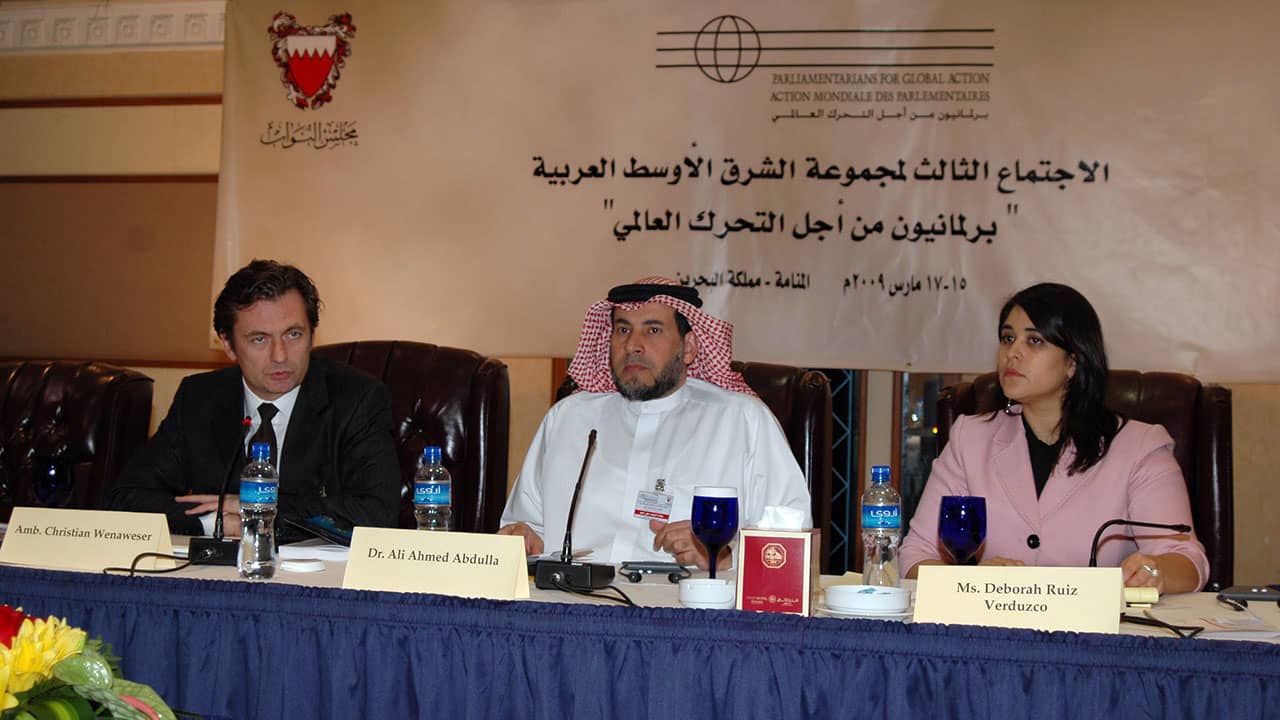PGA has worked with Bahrain parliamentarians from both government and opposition since 2004, but was forced to suspend all activities with Bahrain, when all PGA members from opposition, including Khalil al Marzooq (Deputy Speaker and PGA Board Member) decided to resign from Parliament as a form of peaceful protest against the Government repression of the non-violent demonstration that started in 2011.
ROME STATUTE
Bahrain signed the Rome Statute on 11 December 2000. Bahrain has not yet ratified the Rome Statute.
kampala amendments of 2010
Bahrain did not ratify the Kampala Amendments.
Status on the domestic implementation of the Rome Statute
Bahrain has not yet implemented the Rome Statute
agreement on privileges and immunities of the court (APIC)
Bahrain did not sign the Agreement on Privileges and Immunities.
Additional agreements
Bahrain signed a Bilateral Non Surrender Agreement (BNSA) proposed by the USA on 6 February 2003.
Bahrain is a member of the Arab league, Gulf cooperation Council and the Organisation of the Islamic Conference.
progress and pga action
On 9-10 February, 2010 Bahrain attended the PGA Regional Parliamentary Conference: The Rule of Law and the Protection of Civilians meeting, Working Group on the Universality of the Rome Statute in the MEMED region Parliament of Egypt, Cairo.
In March 2009, PGA conducted a mission, accompanied by Amb. Wenaweser to Bahrain where PGA highlighted the importance of promoting the adoption of implementing legislation (crimes bill) in Bahrain, especially in light of the judicial reform needed, and the prospects of some partisan violence due to internal politics. Work on the implementation of ICC crimes would provide for an important deterrent factor for future crimes.
PGA Intervention on Peace and Justice at Conference "Principles of International Criminal Law and the ICC", co-organised by The Friedrich Ebert Foundation and the Arab League Secretariat Cairo, Egypt, 8-9 October 2008
30th Annual Forum on Democratic Institutions and the Rule of Law and the V Consultative Assembly of Parliamentarians for the ICC and the Rule of Law (Participation of delegations from Bahrain, Israel, Jordan and Lebanon) National Congress, Dominican Republic, Santo Domingo 30 & 31 October 2008.
Meeting of PGA's Working Group on the Universality of the ICC in the Middle East and Mediterranean Countries
(The Hague, The Netherlands), June 11-12, 2007. At this meeting, a multi-party delegation of Bahraini MPs shared their analysis for the opportunities to the ICC in the current political configuration. Their interventions and concerns highlighted the need to better inform parliamentarians of the realities of the ICC, the mechanisms to guarantee its independence from the control from any government, as well as the realistic contributions that the ICC can make to the promotion of the Rule of Law. PGA Members from Bahrain committed themselves through an Action Plan which included hosting a further meeting on the ICC to be held in the Parliament of Bahrain with the assistance of PGA.
28th Annual Forum on Human Security and the IV Consultative Assembly of Parliamentarians for the ICC and the Rule of Law (Participation of delegations from Egypt, Jordan, Iraq, Morocco, and Yemen) National Diet of Japan, Tokyo, 4 and 5 December 2006
At a Round-table discussion on the ICC co-organized by PGA and Justice Sans Frontières in Lebanon on May 22, 2006, the First Deputy Speaker of the Bahrain Parliament Mr. Abdulhadi Marhoon MP, called for the “immediate ratification of the Rome Statute of the ICC by Bahrain”. This statement provided a strong political backing to the previous announcement by the Bahrain Dep. Foreign Minister Mr. Al-Khalifa concerning the Cabinet decision to join the new system of international criminal justice.
Parliamentarians' Roundtable Discussion on the ICC & informal meeting of the PGA Working Group on the ICC in the MEMED Beirut, Lebanon, on 31 May 2006
PGA Regional Parliamentary Conference: The Rule of Law and the Protection of Civilians - I meeting, Working Group on the Universality of the Rome Statute in the MEMED region Parliament of Egypt, Cairo, 9-10 February 2005
PGA's mission to the Parliament of Bahrain Manama, Bahrain, 2004
Human Rights Council Universal Periodic Review
Bahrain received no recommendation related to the Rome Statute during the Universal Periodic Review (UPR) conducted in April 2009.
On 21 May 2012, at the UPR in Geneva, Bahrain received 7 recommendations to ratify, and some cases implement, the Rome Statute (recommendations issued by Estonia, Finland, Hungary, Slovakia, Latvia, Costa Rica and Switzerland). Bahrain accepted to consider the recommendations.
(See media, http://www.sfgate.com/cgi-bin/article.cgi?f=/n/a/2012/05/23/international/i085046D04.DTL) The head of the Bahraini delegation was the UPR is the newly appointed Minister for Human Rights, PGA's former International Councilor Dr. Salah Ali Abderrahame.
In the 2nd Cycle of the UPR, during the 13th session, Bahrain received recommendations from Slovakia, Latvia, Costa Rica, Switzerland, Finland and Hungary to ratify the Rome Statute, including its Agreement on Privileges and Immunities and to fully align its legislation with all obligation under the Rome Statute, including incorporating the Rome Statute’s definition of crimes and general principles, as well as adopting provisions enabling cooperation with the Court. These recommendations were noted by Bahrain.
During 2012, President Song wrote letters to heads of state or government, and/or other relevant officials, in more than a dozen non-States parties, urging consideration of joining the Rome Statute, outlining the benefits of ICC membership and clarifying some common misperceptions. Unfortunately we did not receive an answer to many of these letters.
The countries approached with these letters include: Algeria, Bahamas, Bahrain, El Salvador, India, Indonesia, Jamaica, Malaysia, Micronesia, Monaco, Morocco, Palau, Papua New Guinea, Sri Lanka, Tonga, Turkey, Tuvalu, Ukraine and Uzbekistan.









